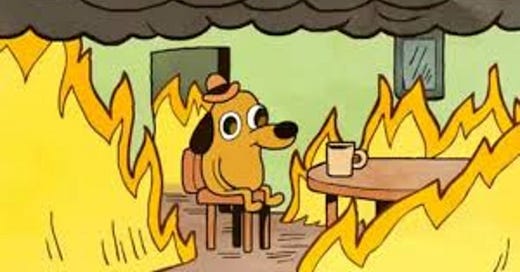Embedded is your essential guide to what’s good on the internet, from Kate Lindsay and Nick Catucci.🧩
I encourage everyone lucky enough to be experiencing the first signs of spring weather today to take a walk outside without their phone. Touching grass optional. —Kate
One of the ideas I’ve been working to unlearn the past few years is that there’s some greater narrative—mysterious, but vaguely malevolent—determining the events in my life. I have to remind myself that a clean bill of health at the doctor’s office does not mean I’m due for a tragedy at the next one. That if I haven’t heard from my friend in a while, texting them “r u alive” won’t make it so they died. But I don't think I'm alone among other mostly safe, comfortable people in thinking, lately, that bad things keep happening.
Start with the short list of terrible events since March 2020, some of which have touched me directly, and others that have simply made me more despairing about the world at large: Covid, the killing of George Floyd, the stress of the election, the aftermath of the election, reproductive rights being stripped away in Texas and elsewhere, Covid again, Russia invading Ukraine. What was the point of hoping, planning, being excited about the future, if all it was going to be was one bad thing after another?
But if we reject, as we should, that there’s an only-bad-things narrative determining our lives, then we have to find the other explanation for why it feels like this—and, in my opinion, it has almost everything to do with the internet.
The internet is wildly different than it was even just before March 2020. What was a social tool (albeit an increasingly omnipresent one) pre-Covid became the primary plane of existence for some of us the past two years, connecting us not just to more people than ever before, but giving us an extremely effective window into their experiences. Through my phone I witnessed, seemingly up close, Covid symptoms, recovery, death due to being immunocompromised, death despite not being being immunocompromised, vaccines working, vaccines “not” working, relief that the pandemic will soon be over, insistence that the pandemic will never be over, ways to help, but actually these other people need your help more. Silence is violence—but don’t say the wrong thing. I watched live streams of an insurrection, asked Siri how to stop a coup, went to TikTok to soothe myself with videos of dogs, was served first-person footage from people in Ukraine instead, Googled nuclear war. At the end of it all, I feel exactly like this.
People have started to wonder out loud if perhaps we aren’t supposed to be this connected, that, per Dunbar’s number, we stop being able to effectively interact with and understand the experiences and thoughts of others after around 150 people. Anything more, and the connection is no longer meaningful—and has the potential to be detrimental. I think about this, and about how, through Twitter and TikTok and Instagram, I probably interact with well over 150 different people’s thoughts and feelings each day.
Not only are we overwhelmed by this connection, but its density requires increasingly frantic appeals for our attention. Our worst instincts and fears are framed as questions in headlines: “How Scared Should I Be About Nuclear War?” If people believe one thing—be it an opinion on current events or the excellence of a TV show—you can quickly and successfully divert their attention by asserting that, actually, the opposite is true. If all else fails, leap to the extreme. Something John Green points out in The Anthropocene Reviewed that I now can’t stop noticing everywhere is how apocalyptic language is so often used as an incentive in even the most inconsequential circumstances: Get it before they’re gone, last chance, the countdown is ON. Media, be it social or TV or news, profits from keeping us in a state of anxiety. In other words, it behooves a lot of companies across a number of industries for us to always be worried that the worst is yet to come.
And the truth is, if you look at the whole scope of humanity, that is always going to be true. At any given time, hundreds of bad things are happening on scales big and small, and they’re often happening for no good reason. The internet has made that more obvious than ever, serving us not just the objective fact that a given event is unfolding, but also inciting in us the relevant emotions. I would not blame anyone for collapsing under that weight.
But the world needs you to be useful. You need to feel like there’s a reason to do your part, and to succumb to the only-bad-things narrative erroneously eliminates hope. Part of why I advocate for active, not passive, internet consumption is to allow for each of us to say “I do not have space for this bad thing,” and adjust our mute filters accordingly. Not to block out all the bad things, but to narrow down what you consume all day, every day, to the things you can actually process—and possibly change.



